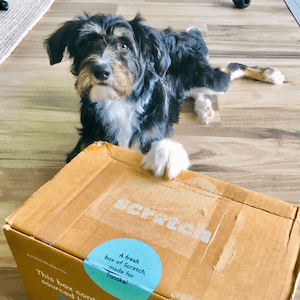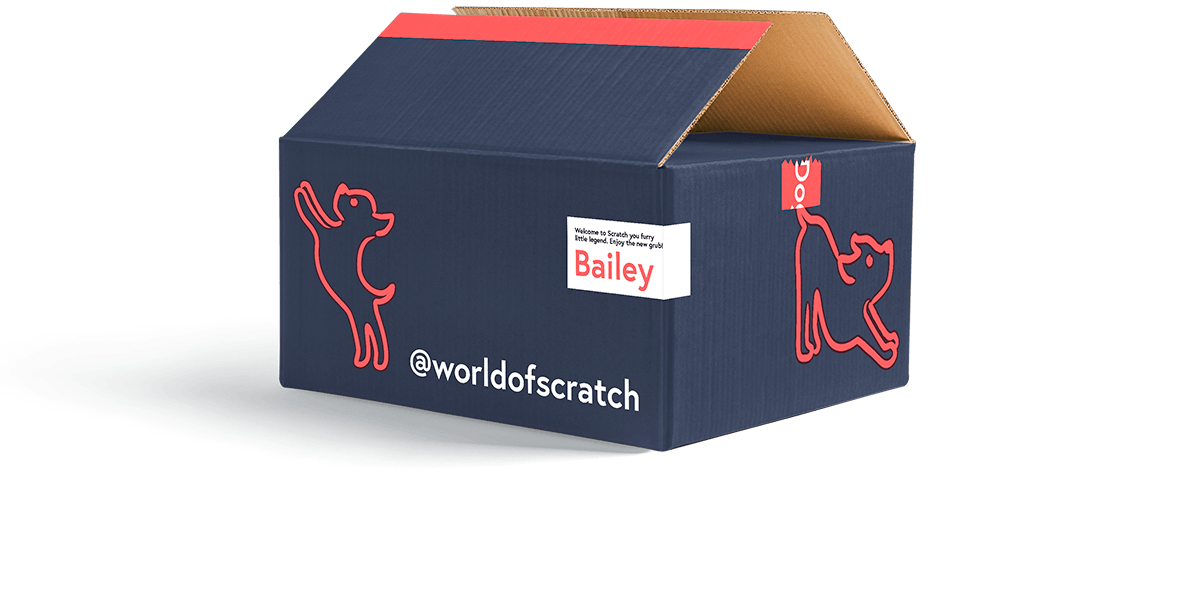“Mack is a staffy with skin and food allergies, so you can imagine how happy I was to find a dog food with NO chicken listed in the ingredients.
I’m very happy with Scratch, and so is Mack!!”
Itchy skin. Ear infections. Tummies that can’t handle change very easy. Food allergies in dogs seem to be becoming more and more prevalent.
Let’s take a look at food allergies in dogs, what to look out for and whether your dog’s issue might actually be an intollerance.

Let’s look first at the difference between food allergies in dogs, versus intolerances.
Allergies are typically more serious and involve multiple body organs, but not typically the stomach. Environmental and dog food allergies send their immune system into overdrive, trying to flush whatever their body thinks is stuck in their system. While allergies are sometimes caused by food, most allergies in dogs are caused by the environment and seasonal changes, or intolerances. Only around 10% of allergies are due to food.
In contrast, food intolerance symptoms are generally less serious and often limited to their tummy’s. Dog food intolerances can range from serious and sudden, to minor where a dog can handle small amounts of something, but starts to develop diarrhoea.
Intolerances are far more common than true food allergies in dogs.
Any ingredient can create an allergy or stomach reaction, but the most common culprits are proteins found in:
It’s no coincidence that these are the most commonly included ingredients in commercial dog food either and virtually impossible avoid in lower quality supermarket food. That’s why Scratch has created two single-protein dog foods.
No breed has specific food allergies that they’re guaranteed to face, but some have enough genetic history to increase the likelihood of suffering allergies and intolerances.
Based off the data we receive from Scratch customers when they sign up, we’ve found the following breeds to commonly suffer from food allergies and intolerances:
When dog allergies strike, the immune system tries to flush the invader – real or not. Think of it like hayfever versus actually breathing in something nasty. Their bodies don’t know the difference, creating inflammation around the body.
The most common dog allergy symptoms are itching, licking paws, a rash or hives (most easily seen on their belly), or sore joints. Look out for difficulties breathing or wheezing, which suggests a more serious dog allergic reaction.
Intolerances don’t show through the body in the same way, instead creating gas, diarrhoea or vomiting.
First, use the advice on this page and from your vet to work out whether it is likely dog allergies or an intolerance to food. Only about 10% of allergies are food allergies in dogs, so you might notice that every year the same symptoms pop up. Seasonal environmental reactions (to grass, pollutants or things in the air) are quite common. If it’s an intolerance, look at your dog food. Often a vet will start them on a 3-month elimination diet or you can talk to a quality dog food company like Scratch or a nutritionist to work out a new diet.
Most Australian vets diagnose a condition with a 3-month elimination diet, but it’s not a rigorous process and often nutrition and how dogs bodies process food and build up intolerances is under-appreciated. We suggest talking to our team or a holistic vet.
Diet can really go a huge way to avoiding (and even correcting) intolerances, as well as reducing environmental and dog food allergy responses. The ingredients in Scratch help to reduce inflammation, and don’t include dairy, chicken or gluten – common culprits of allergies.
For the most sensitive dogs, we recommend the Scratch Kangaroo dog food recipe. It’s single-protein, grain-free and avoids all of the common causes of dog food allergies and sensitivities. It’s also got a mix of 4 healthy oils (coconut, salmon, flaxseed and sunflower) to help sooth inflamed skin.
In serious cases, your vet may prescribe medication to suppress the bodies excessive immune responses. Medication to initially treat the symptom and a healthy dog food diet to correct the cause is usually the winning combination.
We specifically designed Scratch dog food for allergies to help alleviate your dog’s allergic reactions. See how our food goes about it, the ingredients we avoid and how we’ve helped 1000’s of Aussie dogs with relief.

Normal store dog food can be up to 9 months old before it hits your shelves. We ship Scratch within days of making it.
A 28% protein hit to keep your pup up and at it all day long.
Not all ingredients taste the same. We find the best, unprocessed Aussie ingredients to keep your dog healthy.
Say goodbye to runny tummies and hello to perfectly firm number 2s.
.a{fill:none;}
Most grain free food swaps a crappy grain for a crappy processed starch. Scratch is choc full of premium meat & whole veggies.

“Mack is a staffy with skin and food allergies, so you can imagine how happy I was to find a dog food with NO chicken listed in the ingredients.
I’m very happy with Scratch, and so is Mack!!”

“Since starting Duke on Scratch he isn’t scratching so much & no more runny #2’s!!!
Now onto the customer service. Hands down THE BEST, customer service around!”

“Scratch is bloody awesome. Tooska has always had the worst tummy & we have given away multiple bags of food.
She has had so much more energy, she’s so much happier and has **** you can scoop… Thank you so much Scratch”
4.9/5 Average Rating from
over 50,000 Aussie dogs

Our most popular food, this high-protein recipe is designed for dogs of all ages, including those large breed pups.
Our high-protein fish dish for sensitive and senior dogs that’ll go easy on their guts.
Delicious single-protein food with plenty of pasture-raised lamb and whole, healthy grains. Great for very active dogs.
Our original game-changer and the best thing if they can’t seem to shake tummy & skin problems on any other food.
If you do have anything super specific you want to chat about, hit us up on live chat.
Dog food allergies will show up within an hour, though only about 10% of dog ...
Dog food allergies will show up within an hour, though only about 10% of dog allergies are caused by food and the rest the environment. If your dog is having tummy trouble or vomiting, it’s more likely a bug or intolerance.
If your dog is truly allergic to a foo d (any food is technically possible to...
If your dog is truly allergic to a foo d (any food is technically possible to produce an allergic reaction), you might notice anything from chronic ear inflammation, licking their feet, itchy skin or an itchy rear end.
Chicken is one of the primary causes of intolerances for dogs. It typically d...
Chicken is one of the primary causes of intolerances for dogs. It typically doesn’t produce immediate allergy responses, but does upset a lot of stomachs and over time, results in sore red bellies and itchy skin.
Avoid beef, dairy, chicken, soy and wheat – the most commonly used ingr...
Avoid beef, dairy, chicken, soy and wheat – the most commonly used ingredients in commercial dog food. That’s why we make a single-protein lamb and a single-protein kangaroo recipe for dogs who suffer with allergies.
The longer a dog is fed the same thing, the higher the chance of a dog develo...
The longer a dog is fed the same thing, the higher the chance of a dog developing food allergies and intolerances over time. That’s why it’s crucial for long-term health to feed a well balanced recipe and avoid bacterial overgrowths.
If your dog is suddenly responding to food, it’s more commonly an intol...
If your dog is suddenly responding to food, it’s more commonly an intolerance. This can be due to seasonal changes in how they’re feeling, a change in the recipe (dog food companies regularly change without disclosing) or in some cases, their body telling them that their stomach bacteria is overgrown in a particular way (typically due to overexposure of an ingredient).